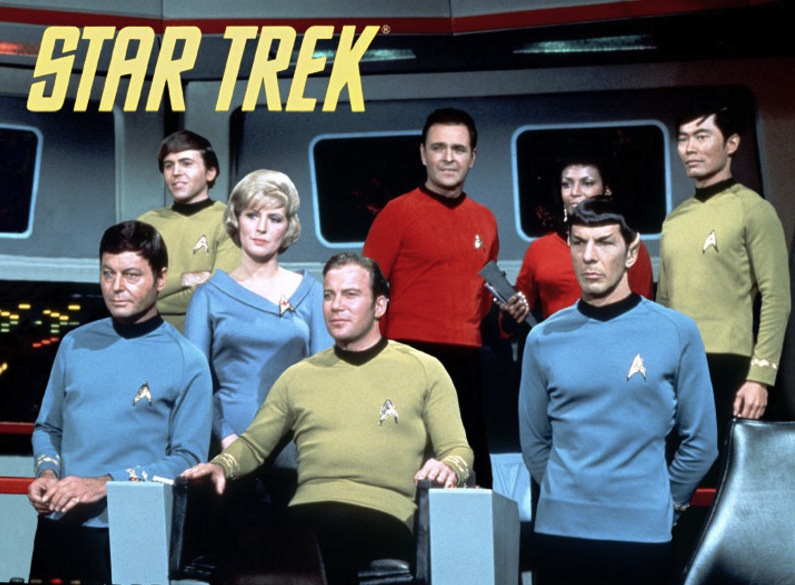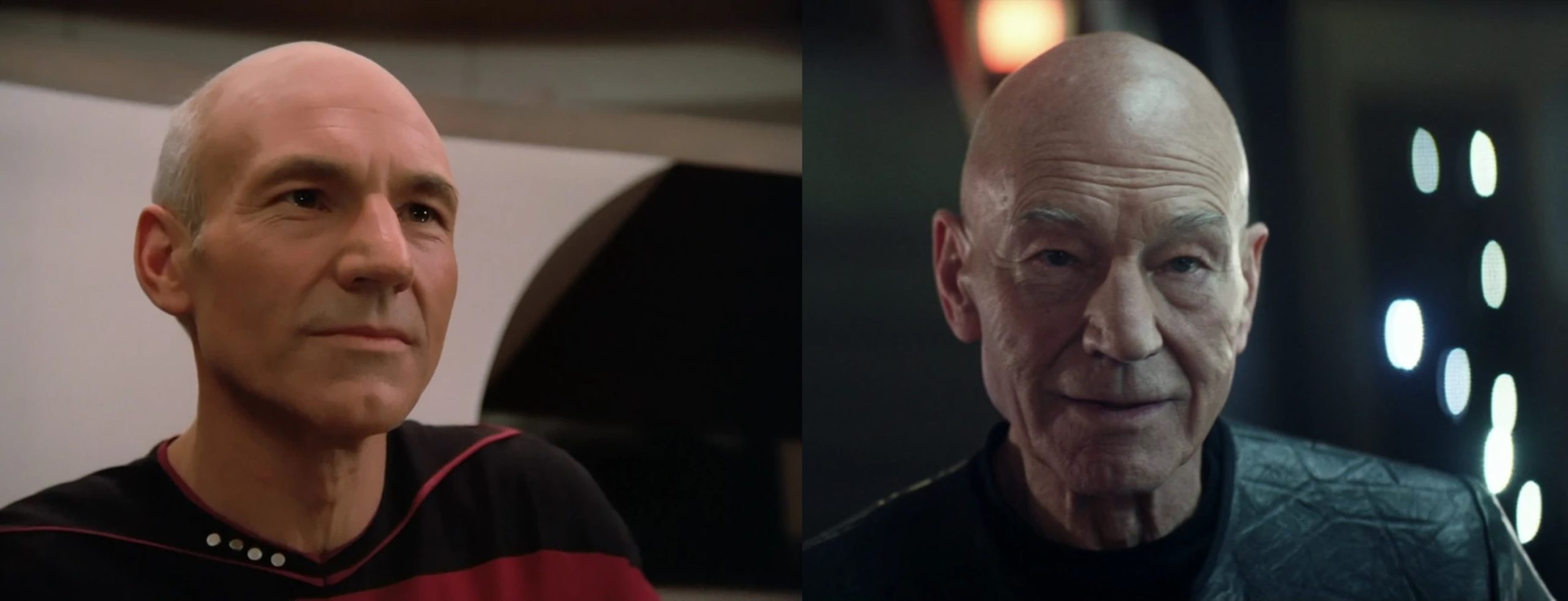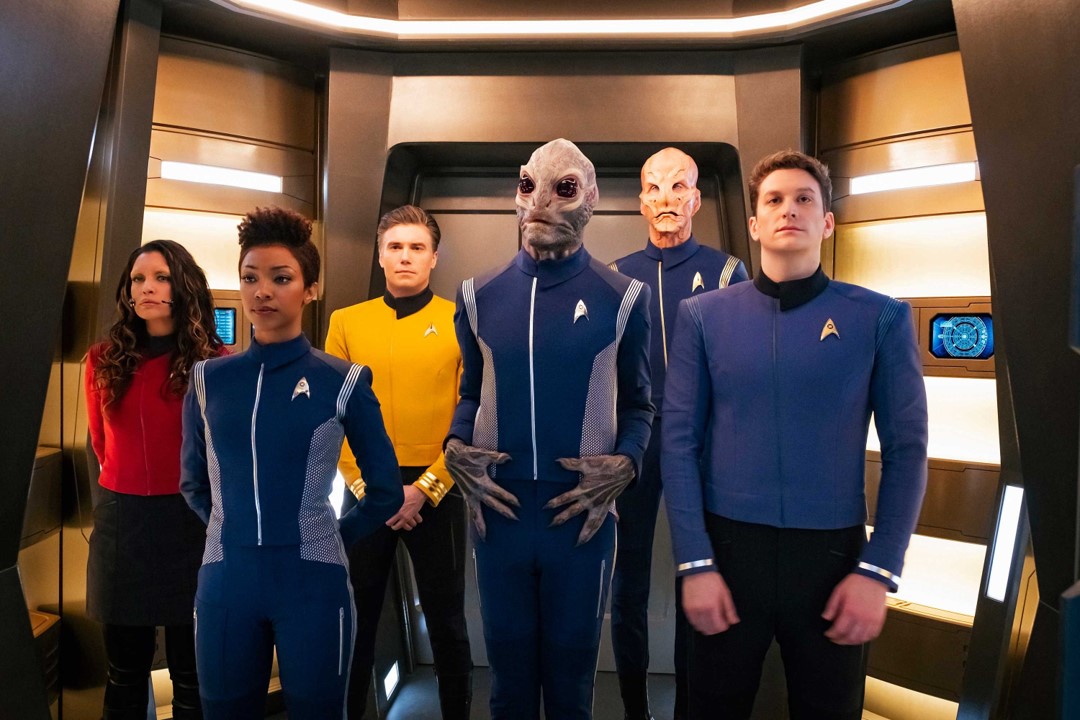Jason M. Barr May 26, 2021
Peace on Earth
In the 23rd century, humanity has finally found peace. The hatred and violence inflicted upon each other for millennia are finally gone. From the ashes of war and conflict and through the beneficial use of technology, Planet Earth is united into one global nation. Its people are now free to explore themselves and the rest of the galaxy.
Such was the inheritance bequeathed to us from the mind of Gene Roddenberry (1921-1991), who, with no minor difficulty, created Star Trek in 1966. The universe he initiated would live long and prosper.
Star Trek and Us
A.J. Black’s new book, Star Trek, History and Us: Reflections of the Present and Past Throughout the Franchise, looks back over its history and all its TV and movie iterations. Black, an author, media critic, and podcaster who knows his Star Trek inside and out, provides a welcome addition to the field of “Trekology,” the body of social scientific, historical, and cultural analyses of Star Trek.[1]
Black takes us on a time-traveling meta-exploration. His central argument is that the shows and movies reflect the cultural attitudes and anxieties of the periods in which they are written, primarily, though not exclusively, about war and conflict. In the process, we follow Kirk, Picard, Sisko, Janeway, Archer, and Burnham and see the fears and concerns about our world in their actions.

The Chapters
The First Two Decades
Chapter 1 focuses on how Gene Roddenberry’s experiences during and after World War II shaped the show’s vision. As Black writes,
Roddenberry’s 1960s series was a show steeped in idealism about humanity’s future yet powerfully obsessed with the nature of religion and a fascination with warfare, particularly the ever present, Cold War shadow of the bomb.[2]
Chapter 2 turns to the two decades following the show’s cancellation in 1969, after only three seasons. The 1970s was a mixed time for the franchise. Roddenberry created an animated Saturday morning series, debuting in 1973. Though it was ostensibly for kids, it did not shy away from the themes of the original series (TOS). However, it lasted only a year, while attempts to revive the original series failed.
After the success of Star Wars, Star Trek: The Motion Picture was released in 1979. It was not a success, either critically or financially. But it did keep the franchise alive and paved the way for five more films with the original crew (and with Kirk appearing in an extra-dimensional realm in the 1994 film Star Trek Generations).
The Renaissance
The renaissance of the franchise finally came in 1987 with the creation of The Next Generation (TNG), which updated Roddenberry’s conception of Star Trek. Led by Captain Jean-Luc Picard, the Enterprise in the 24th century no longer operates in the world of existential threats (though the Borg occasionally dispels that notion). Rather, Picard plays the role of uber-diplomat, putting out minor inter-galactic fires to maintain the order and dominance of the United Federation of Planets. TNG launched four Hollywood films along the way, each with varied success.
The 1990s
In Chapter 3, Black turns to the 1990s. After seven successful seasons of TNG, the question arose about where to take the franchise next. Without Roddenberry, who died in 1991, the show’s inheritors, most notably Rick Berman, were, in some sense, freed from the rigid adherence to Roddenberry’s utopian Federation.
The 1990s witnessed a double track. The first was the creation of Deep Space 9 (DS9) (1993-1999). It was a radical departure from prior shows which placed a 24th-century Federation crew on a fixed space station orbiting the planet Bajor, recently decimated by war and occupation. DS9‘s seven-year run took the show into much darker territory, exploring personal and social issues related to the horrors of war.
In parallel was Voyager (1995-2001), which was more like a direct offshoot of TNG, though with a twist. Captain Janeway and her crew were thrown 75,000 light-years away from home by an alien being. Unlike Picard’s Enterprise, which left Earth to explore the galaxy, Janeway struggled to get her ship and crew back home and did not linger long enough to explore or make friends.
The 21st Century
Chapter 4 turns to the 21st century thus far.[3] Following Voyager‘s successful run, the next iteration was Enterprise, launched in 2001. The prequel aimed to fill in gaps about the Federation’s founding and the first systematic human exploration of the galaxy. Enterprise is now led by Captain Jonathan Archer, a century before Kirk’s 5-year mission. Like the first series, it was canceled early, due to low ratings, and which led to a 16-year TV hiatus until the release of Discovery in 2017. However, in 2009, there was a movie reboot, returning new versions of Kirk, Spock, et al., to the big screen. Its box office success led to two sequels.
Discovery features first officer Michael Burnham—the human adopted sister of Spock—who in Season 1 mutinies against her captain, starts a war with the Klingons, and spends the rest of the season fighting for personal and professional redemption. 2020 also witnessed the return of Jean-Luc Picard in the eponymous Picard. Now an old man and booted out of Starfleet, the former captain is forced to take on the Federation itself, which has been infiltrated by a paranoid cult, seeking to destroy all synthetic life (a/k/a androids) within the Federation.

The Debates
Black’s narrative structure allows him to demonstrate that the shows’ depictions of war and conflict have evolved based on the interplay of several internal and external forces.[4] First is Roddenberry’s original vision and the universe he created. Roddenberry was a firm believer in secular humanism. The Star Trek world he advanced was one where humans had eventually created—out of the ruins of war—a utopia on Earth, based on mutual understanding and compassion.
The other humanoid societies, such as the Romulans and Klingons, provide foils to demonstrate the antiquated sides of ourselves—those still clinging to false notions of empire or aggression. The final frontier of space was the ultimate quest for knowledge and wisdom; the crew could leave home without fear that the house would be robbed.
American Cultural Phenomenon
The original series was canceled after only three seasons due to poor ratings. And yet, Roddenberry’s legacy was nurtured and grew during the 1970s, as loyal fans expanded his universe through fan fiction and conventions, all the while enjoying the reruns. Within a decade, Star Trek belonged to the canon of American pop culture. Spock and Kirk, the transporter, the “high tech” bridge with its abundance of buttons, knobs, and pings, provided fans with a deep emotional connection to this world.
But that connection was multifaceted. It was first and foremost compelling science fiction that created a galaxy from the ground up. But it was also a show about engaging viewers in debates with the significant events of the day. Since the Enterprise exists two centuries hence, the writers were liberated from many (but not all) of the taboos of the silver screen. The crew was multi-ethnic and multi-racial; and the episodes depict the tragedies of World War II and the possibility of nuclear annihilation. It also addressed issues of religion, hatred, and the quest for utopia. To fans, that dialogue with history, sociology, and psychology was just as meaningful as the characters themselves.
Post-Roddenberry Star Trek
Roddenberry died in October 1991, just as the fifth season of TNG was getting underway. His protégés would need to decide how to carry the franchise forward. This generated a new set of tensions and questions. First, as Black discusses, was the taste for nostalgia—how much of the future iterations should pay homage to the original galaxy? How much should we get of Spock or Kirk’s backstory? Should future ships look like the original Enterprise, and how many old characters should resurface?
The second was the degree to which the episodes should stick to Roddenberry’s conception of utopia and the Federations’ principles of justice and peace versus creating a darker, more cynical world. The third tension was how much balance should be dedicated to action and narratives—wars and “cowboy diplomacy”—versus character development and personal, internal conflicts. And finally, how deeply should the series engage with the current events of the day—particularly with the conflicts of each decade?
Stay or Go?
TNG and Voyager stick to the core principles. DS9 moves away but focuses on characterization, as well as the moral, ethical, and social impacts of war and conflict. It still feels like Star Trek, even if there are darker elements and deviations from “Roddenberry’s rules.” Enterprise warps mostly into the space of nostalgia—though, in Season 3, it engages with the pain and impacts of war. But the show could never fully generate the success of its forebears. The 21st-century iterations have moved Star Trek much further away and are now trying to jockey with the Marvel Comic Universe for eyeballs and monetary supremacy. They have fully embraced nostalgia and action-adventure.

The 9/11 Effect?
Black argues that the 21st-century shows were deeply influenced by 9/11 and the War on Terror. No doubt this thinking is present in the various episodes, but the latest versions have ditched much of Roddenberry’s ideals. Discovery and Picard have taken the franchise down very dark paths—darkness for the sake of darkness, not darkness to lead us to the light. They have thrown away the dramatizations and debates that made the early iterations so fascinating in favor of action, conspiracy, and nostalgia.
Discovery is good TV. The CGI makes the battles and planets feel real; the depictions of Klingons, speaking in their native language, is quite compelling; and the acting and narrative arcs are fine. But Season 1 is a Space Opera. And Picard is very pessimistic. Its conspiratorial nature provides a world with the Federation coming apart at the seams, though in the end, of course, good triumphs over evil.
While Black tries to persuade us that this was born of its experiences with 9/11, I would argue that the series’ turns are both more profound and superficial. First is the economics of the franchise. When TOS went on air in 1966, Paramount Television and NBC took a gamble by broadcasting it. But they had little to lose. Networks air new shows all the time, and they expect most of them to fail.
The Brand
Today, however, Paramount, the owner of Star Trek Universe, has a vested interest in preserving the Brand and its intellectual property rights. It cannot afford to gamble with the product, and, besides, much of the original magic depended on Roddenberry himself. In this sense, Star Trek today is too big to risk; the product proffered is sci-fi action-adventure in a familiar galaxy. It peddles a simulacrum of Star Trek but is devoid of its soul, not unlike many of TOS episodes where another being possesses the body of Kirk. It walks like Kirk and talks like Kirk, but the essence of Kirk is someone else.
Nonetheless, the programs of the 21st century have—at least implicitly—engaged in a dialogue with current events. It is no longer a show about suggesting a better way because, I would argue (as might Black, though I do not presume to speak for him), that there is little feeling today that we are any closer to Roddenberry’s vision. Why should the episodes return to something he did not get right?
The 1950s and 1960s were good economic times, despite Cold War fears. Poverty was diminishing, incomes and the middle-class were rising, and technological innovations were sweeping across the U.S. In the 1980s, despite severe problems in the Rust Belt cities, free-market ideology engineered an economic boom while Communism fell by the wayside, leaving America the sole superpower.
Roddenberry Undone
But the first two decades of the 21st century have wiped away degrees of hope that an advanced capitalist society would flower into utopia. First was the tragedy of 9/11 and the on-going belief in some parts of the world that Western market-oriented democracies are simply another form of imperialism.
But, arguably, the birth of the internet created new problems with which we have yet to come to terms fully. There is rising inequality between “the skilled” and “the unskilled.” This has generated the feeling that big tech and hedge fund billionaires (and real estate moguls) are manipulating the economy (and government) to their personal ends, to the detriment of the greater good.
The internet has contributed to the erosion of democratic institutions and the health of “agora,” corrupted by Facebook and other social media platforms, which allow for the spread of misinformation and the promotion of hate and tribalism.
Despite the hope that we could all get along, we still see global political divisions. Russian and Chinese leaders are creating mini-Cold Wars with the West. The ongoing conflicts in the Middle East show little sign of abating. Finally, we have yet to fully reckon with the looming threat of climate change from our dependence on fossil fuels. One cannot help but fear—even in an unconscious way—that the future is uncertain.
Roddenberry’s vision was to take the horrors of reality and use his galaxy to provide a glimpse of a better, more humane way. The current iterations of Star Trek play it safe by taking the horrors of reality and mirroring them back to us. Utopia, it seems, is a failed 20th century notion.
The Lesson
Within the debate about the true nature of Star Trek, however, A.J. Black provides a thought-provoking and informative book. If there is one lesson that he teaches us, it is that we cannot truly know Star Trek without knowing ourselves.
Read more posts are Star Trek here.
—
[1] Such writings include The Meaning of Star Trek (1997), Trekonomics The Economics of Star Trek (2016), and a few blog posts by yours truly. A google scholar search of the term “Star Trek” will also provide various references.
[2] Page 7 of Star Trek, History and Us: Reflections of the Present and Past Throughout the Franchise.
[3] Not discussed is Seth MacFarlane’s recent take on Star Trek, The Orville, though hopefully future discussions of the franchise will include it.
[4] For the sake of brevity, in what follows, I just focus on the TV shows. The movies are, of course, an important part of the franchise, but one can also argue that they followed the TV series rather than forging new paths.